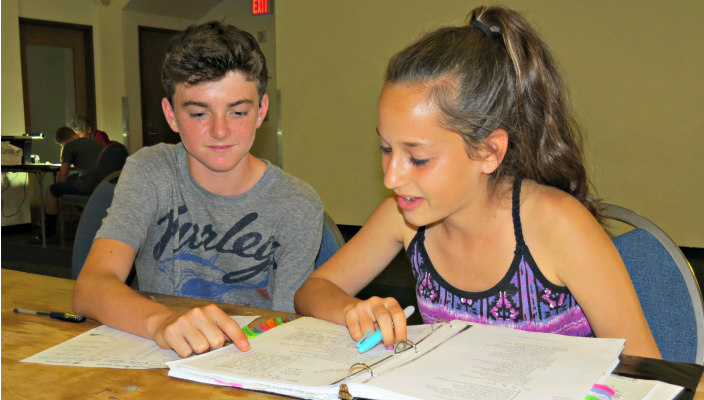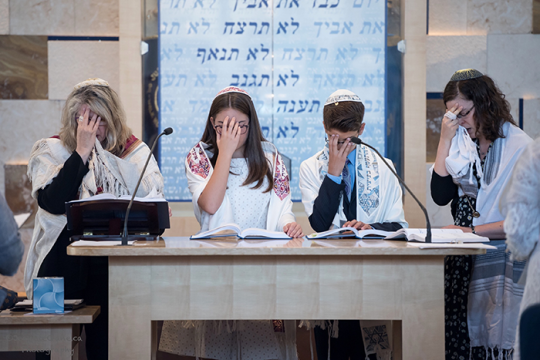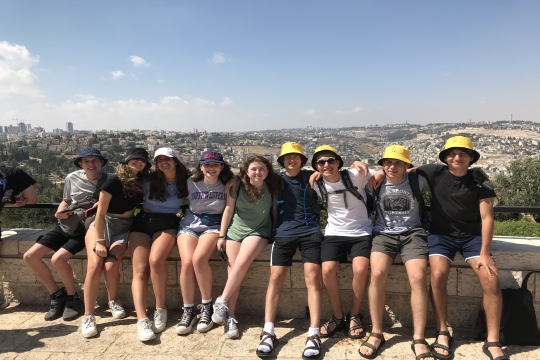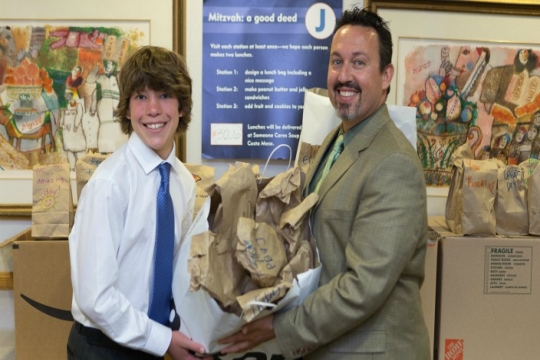
When you walk into the social hall at Temple Adat Elohim in Thousand Oaks, CA, on a Tuesday evening, you’re met with a cacophony of sound coming from the 70 people inside.
As you enter, you can make out some of the conversations of the 35 pairs working in chevruta, listening to Hebrew as our tutors teach the 25 prayers to their students, and some social conversations as our tutors build a personal connection with their students.
You can hear the sound of chanting as melodies are taught, and the sound of reassurance as a tutor says to her nervous student, “I was nervous, too, when I became a bat mitzvah last year, and I’ll help you.”
And that is the moment that you can see the magic of a new program in which our newest young adults – who we call Tzofim, meaning “scouts” – now guide their students through the process of becoming b’nei mtzvah with a loving and gentle hand. Our Tzofim use the skills they worked so hard to master to now train the next generation of Jewish adult, creating lifelong connections between teacher and student and teaching our newest b’nei mitzvah students that they have the ability to impact another’s life in a significant way. Rather than simply returning to seventh or eighth grade and moving on, these new b’nei mitzvah can instead begin to practice what it means to be an adult Jew, working hard to continue the process of perfecting our world.
As difficult as it is to imagine such an environment being conducive to learning, you only need to look at the results of our program, over the course of time, to see its success.
Our students are leading more Shabbat services than ever before.
They’re not only mastering 18-24 verses of Torah and up to seven verses of Haftarah, they’re also leading every aspect of the service. Although we were prepared for a decrease in instruction to try to foster an increase in connection, we see that our students are actually rising to new heights under our new program.
Our retention has increased significantly.
In the past, most of our seventh grade students left the religious school environment the week after they became b’nei mitzvah’ now, nearly 100% of them stay for the remainder of the year. On average, more than 60% of our students continue onto eighth grade and beyond, solidifying our point that b’nei mitzvah is not a destination but rather a stop along the lifelong journey of Jewish education.
We’re creating lifelong bonds.
Our old system of one-on-one, adult-to-child weekly tutoring sessions fostered isolation and a lack of connection. That’s been replaced by an experience that creates lifelong connections and communal celebration between young tutors and their mentees.
Our students are more confident than ever.
The peer-to-peer structure has eliminated some of the fear and nervousness that we so frequently saw in our old program fostered. Now, as a result of the preparation from our Tzofim, we see much more confidence on the bimah.
We’re communicating better with b’nei mitzvah families.
Communication between our tutoring team and the parents has increased to the point that no student falls through the cracks of our system.
We’re better serving students’ unique needs.
The Tzofim project has broadened our ability to work with students with learning challenges – in part because some of our finest tutors are those who faced these challenges themselves and found new and innovative ways to teach their peers.
Our Tuesday evenings begin with a communal dinner, provided by the temple, during which time our seventh- to tenth-graders share a social experience around the dinner table. What follows is peer-to-peer tutoring of the 25 prayers and blessings we ask our b’nei mitzvah students to master. Six adult trope specialists teach Torah and Haftarah, pulling out our students within seven months of their bar or bat mitzvah for 15 minute weekly sessions in which they learn and master their portions. We carefully match students with their tutors, making sure personalities and skills work together.
Our parents have embraced the program, too, not only because of its success but also because it eliminated an additional weekly trip to the synagogue for a tutoring session. Following each Tuesday evening class, we send a detailed email to each parent explaining what his or her child accomplished and where they need to focus their efforts the following week. I also make a series of phone calls to the parents of those students who need extra attention. Though it takes more time and energy to pull off a program like this, we see the benefit in our results.
The problem we face now is one that we never anticipated – too many volunteers and not enough students! The bottom line is when students become Tzofim, they become essential: They have a valuable role to fulfill and an important place within our synagogue community.
To learn more about how to connect b’nei mitzvah students with others in the community who will nurture, teach, and guide them, sign up for a URJ webinar "Building Mentorships into the B’nei Mitzvah Experience" on February 7th, 1pm ET.
To learn more about the Tzofim project and other b’nei mitzvah innovations, visit the URJ B’nei Mitzvah Revolution and the URJ B’nei Mitzvah Revolution interactive Innovations Guide.
Have something to say about this post? Join the conversation in The Tent, the social network for congregational leaders of the Reform Movement. You can also tweet us or tell us how you feel on Facebook.
Related Posts

Becoming Bet Mitzvah

A $3,250 Gift for Your B’nei Mitzvah Teens

